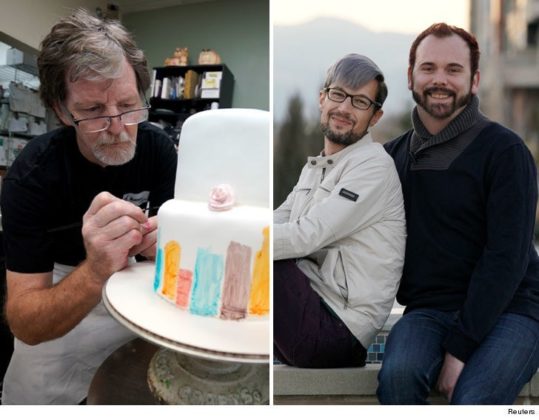It’s one thing to decline to bake cakes for a holiday you disapprove of and another thing entirely to refuse to serve a class of people because of their sexual orientation.
Yesterday, the Supreme Court ruled in favor of a Colorado bakery owner who refused to bake wedding cakes for gay couples.
Happy Pride month?
The Court held 7-2 that baker Jack Phillips’ religious freedom was violated by the rulings against him. While the decision overturned the previous rulings, experts caution that the opinion was written narrowly and the decision applies only to the facts of this particular case.
Yesterday’s ruling may have been intended to be narrow, but it’s hard to imagine a circumstance where discriminating against people in a place of business is justifiable. While Phillips’ business strategy is rooted in his faith in a variety of ways, such as refusing to bake Halloween cakes, the last time I checked, Halloween isn’t a protected class of citizens.
It’s one thing to decline to bake cakes for a holiday you disapprove of and another thing entirely to refuse to serve a class of people because of their sexual orientation.
Of course, the majority argued that the baker wasn’t really discriminating against gay people. After all, he doesn’t interrogate people about their sexual orientation at the door. He just refuses to bake cakes for their weddings.
Writing for the majority, Justice Kennedy argued: “The outcome of cases like this in other circumstances must await further elaboration in the courts, all in the context of recognizing that these disputes must be resolved with tolerance, without undue disrespect to sincere religious beliefs, and without subjecting gay persons to indignities when they seek goods and services in an open market.”
Excuse me while I roll my eyes forever at the idea of tolerance for intolerance.
If Phillips doesn’t want to bake gay wedding cakes, there’s a simple solution that’s entirely consistent with the law, religion, and basic human decency: He could stop selling wedding cakes altogether. But Phillips wants to have his cake and discriminate too, and the Court was wrong to excuse discrimination under the guise of “religious freedom.”
Every damn one of us has freedom of religion. No one forces any of us to pray to a specific god or to attend a specific church, or even to believe in god at all. But the Court was wrong to extend the First Amendment to excuse discrimination.
Narrow or not, the ruling is a dog whistle for bigotry masquerading as “religious freedom.” It opens the door to further litigation by stellar Christians like Kentucky clerk Kim Davis, who made headlines in 2015 for refusing to issue marriage licenses to gay couples.
Justice Ruth Bader Ginsburg, writing as usual for the right side of the Court, argued in her dissent that “when a couple contacts a bakery for a wedding cake, the product they are seeking is a cake celebrating their wedding — not a cake celebrating heterosexual weddings or same-sex weddings — and that is the service (the couple) were denied.”
Imagine the hell that would break loose if Phillips decided to interrogate same-sex couples about their religious beliefs and practices before agreeing to bake wedding cakes for them. “Oh, you had premarital sex?” “You’re not a practicing Christian?” “Those tattoos sure aren’t in line with my Biblical beliefs.”
But of course he’ll never do that because this case was never about Phillips’ religious beliefs. It was about his desire to discriminate. And yesterday the SCOTUS enabled him to do just that.
Jody Allard is a former techie-turned-freelance-writer living in Seattle. She can be reached through her website, on Twitter or via her Facebook page.
Other Links:

